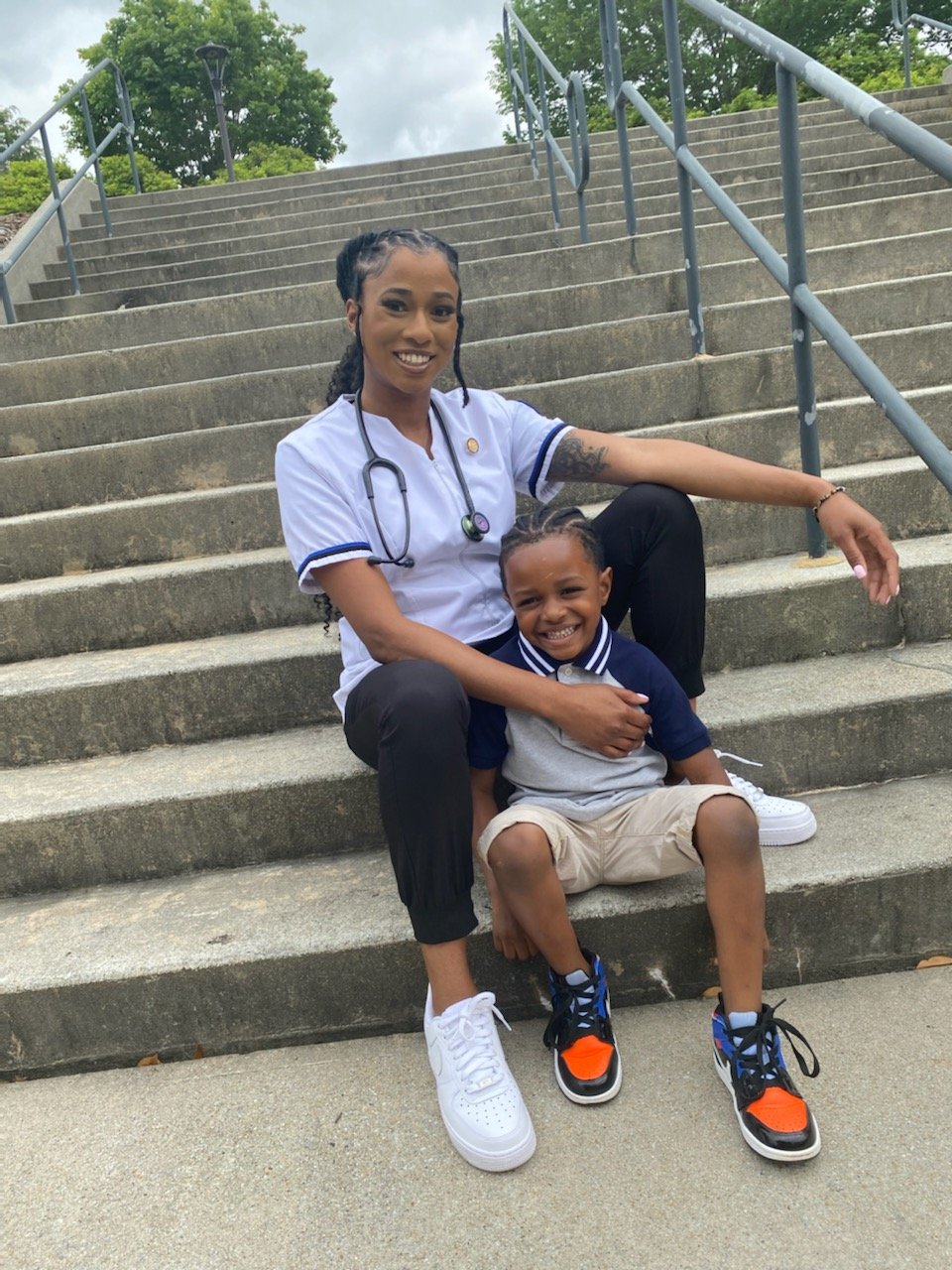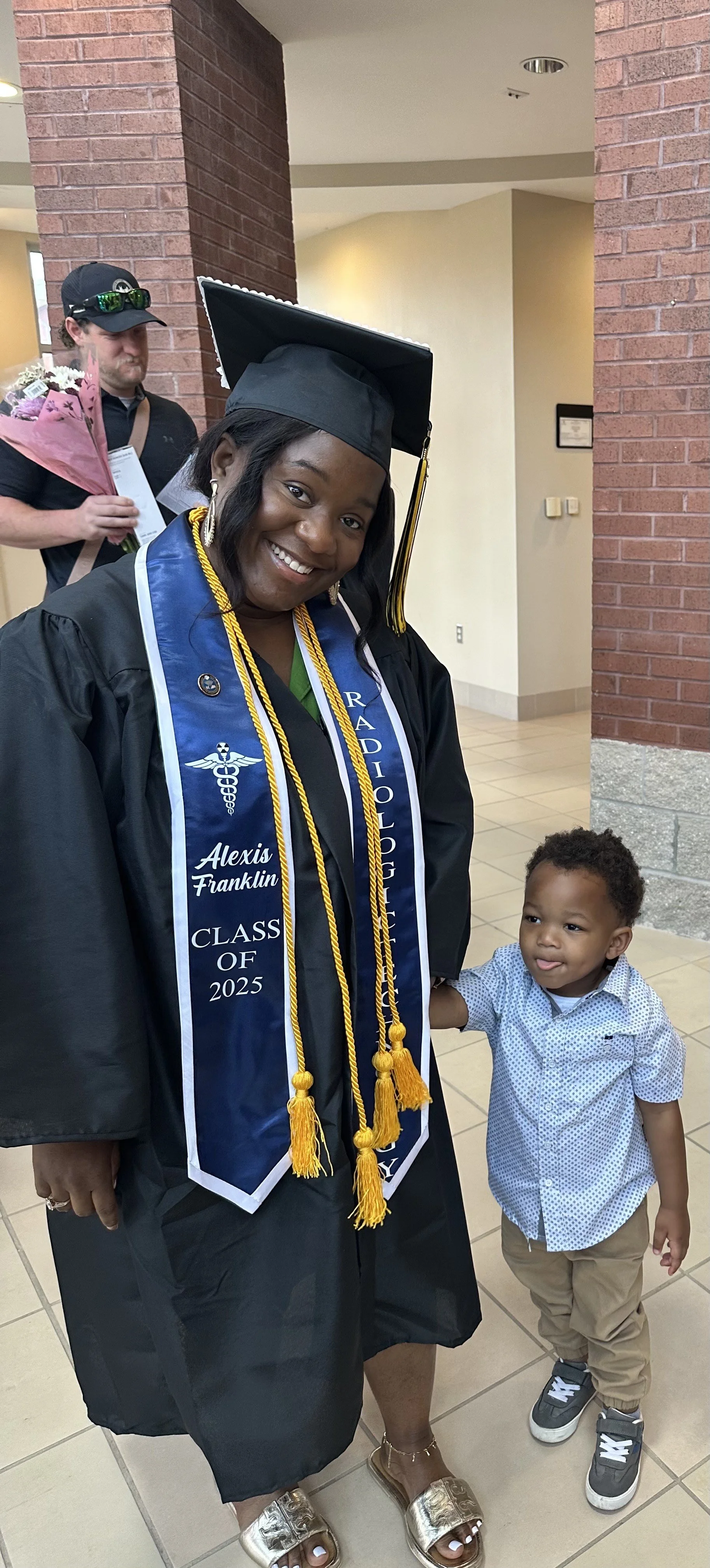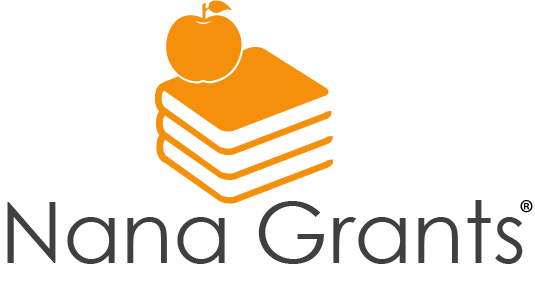
Child Care + College =
Economic Mobility
Each Nana Grant covers 100% of the cost of child care through graduation for low-income student mothers attending an accredited college or university in Georgia.
Our 2Gen Model
Nana Grants embraces a two-generation (2Gen) approach, recognizing that the well-being of children is inextricably linked to the well-being of the adults in their lives. By intentionally focusing on both children and their mothers, we aim to create a legacy of educational success, economic prosperity, and overall health and well-being that passes from one generation to the next.
The 2Gen approach involves:
Working with children and their parents together to build family well-being.
Addressing the needs of both generations to create opportunities for educational success and economic security.
Engaging and listening to the voices of parents/adult caregivers as experts on their families' needs.
Fostering innovation while building evidence of what works for families.
By supporting mothers in their educational journeys, we help build stronger, more resilient families and communities. Our work is inspired by the guiding principles of the 2Gen approach, which include advancing equity, centering on community, and measuring and accounting for outcomes for both children and parents.
Join us in our mission to create a better future for families through education and support.

Nana Grants removes the uncertainty of continuous, quality childcare from the equation so that student mothers can focus on their studies, graduate and have a rewarding, well-compensated career.
How our model benefits student mothers…
-
When we talk about lifting families out of poverty, we must acknowledge that most of these families include children who require childcare while parents work and go to school.
Single mothers with only a high school diploma are three times more likely to live in poverty as those with college degrees. For every dollar a single mother invests in an associate’s degree, her family gets back $16.45 in increased earnings.
-
Georgia’s HOPE Scholarships make college free for many Georgia residents. But without childcare, education remains inaccessible to the families who would most benefit from these scholarships.
The median cost of child care ranges between $6,000 and $10,000, depending on the child care center’s location. No matter where you attend a technical college in the state of Georgia, child care can cost up to three times more than tuition and fees.
-
Though many student parents enroll in college, the added responsibility of caring for children makes it more challenging to complete a credential. Graduation rates for student parents are lower than for non-parenting students. These rates are even lower for single parents. Most student parents lack extra financial resources. Most work, but single parents have higher levels of unmet financial need than their peers and hold more student debt. Despite these challenges, student parents earn higher grades in general. One-third of student parents have a 3.5 GPA or higher.
How our model benefits children…
-
Children who attend high-quality preschool enjoy improved academic performance as they move through elementary school.
Source: National Institute for Early Education Research https://nieer.org/sites/default/files/2023-08/preschoollastingeffects.pdf
A study on the Boston Public Schools’ preschool program found significant long-term benefits for children who attended. These children were more likely to graduate from high school, take the SAT, enroll in college on time, and had fewer suspensions and instances of juvenile incarceration compared to those who did not attend preschool.
Source: MIT Study on Boston Public Schools https://www.ffyf.org/resources/2021/05/new-mit-study-reveals-long-term-benefits-of-high-quality-early-childhood-education/
-
High-quality early childhood programs yield significant economic returns, ranging from $4 to $13 for every dollar invested, due to impacts on educational attainment, employment, health, truancy, and criminality. The Perry Preschool and Abecedarian studies are key examples, demonstrating substantial benefits for participants from low-income families.
Source: Brookings Institution https://www.brookings.edu/research/high-quality-early-child-care-and-education-the-gift-that-lasts-a-lifetime
A $3,000 increase in a family’s annual income when a child is young is associated with a 17% increase in that child’s future earnings. This highlights the importance of early childhood education programs that support both children and their parents.
Source: National Bureau of Economic Research https://www.nber.org/papers/w19745
Studies have shown the positive impact of federal programs like Head Start; smaller-scale programs such as the Perry Preschool Program in Michigan and the Abecedarian Project in North Carolina have also shown success. These programs enable children to develop language, literacy, and prereading skills as well as soft skills such as responsibility, critical thinking, problem solving, conflict resolution, and self-motivation.
Source: Early Childhood Education and the Economy https://www.atlantafed.org/cweo/workforce-currents/2019/01-early-childhood-education-and-the-economy-2019-01-08
-
Participants in early childhood programs are less likely to experience grade retention, more likely to graduate from high school, and more likely to be employed full-time. They also tend to have more positive social interactions and are more community-focused. These long-term benefits extend to reduced likelihood of juvenile incarceration and higher lifetime earnings.
Source: Georgia Family Connection Partnership https://gafcp.org/long-term-effects-of-early-childhood-education-beyond-academics
-
Investments in high-quality early education yield a 13% per year return on investment based on increased school and career achievement as well as reduced social costs.
Source: Heckman Equation https://heckmanequation.org/resource/research-summary-lifecycle-benefits-influential-early-childhood-program
Our Donors
The Liz Blake Giving Fund
Bank of America
Bennett Thrasher Foundation
Betty and Davis Fitzgerald Foundation
Cobb Community Foundation
Community Foundation for Central Georgia
Community Foundation for Greater Atlanta
Community Foundation for Northeast Georgia
David, Helen and Marian Woodward Fund
Gas South
Goodwill of North Georgia & SNAP E&T Matching Donor Partnership
Gwinnett County Community Development Program
Ida Alice Ryan Charitable Trust
May P. and Francis L. Abreu Charitable Trust
Junior League of Atlanta Fund
LuluMa Foundation
Merancas Foundation
Molly Blank Fund, Arthur M. Blank Family Foundation
Narendra Shankar Giving Fund
Nordson Foundation
Ron and Lisa Brill Charitable Trust
SlumberPod
The Imlay Foundation
The Scott Hudgens Family Foundation
Truist
United Consulting
United Healthcare
The Waterfall Foundation
W. Wayne Woody Piedmont Foundation







![FullSizeRender[31].jpeg](https://images.squarespace-cdn.com/content/v1/6423aa065fae233667c64e41/04dc0878-4dd8-427d-91fe-98ebfa668012/FullSizeRender%5B31%5D.jpeg)


